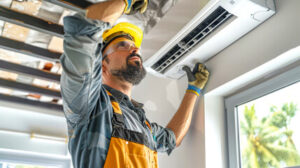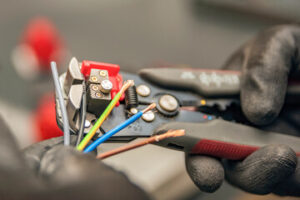Air conditioning systems play a vital role in maintaining a comfortable indoor environment, especially during warmer months when temperatures can become unbearable. While many people rely on their air conditioning systems to provide cool air and comfort, the importance of regular maintenance and servicing is often overlooked.

Proper maintenance ensures that the system operates efficiently, extends its lifespan, and prevents unexpected breakdowns. Investing time and resources in air conditioning service not only improves the system’s performance but also provides long-term savings and comfort. Understanding the key reasons why air conditioning service should be a priority can help homeowners and business owners make informed decisions about maintaining their cooling systems. Contact AC Repair Orillia for professional help.
One of the most important reasons to prioritize air conditioning service is to maintain energy efficiency. Over time, dust, dirt, and debris can accumulate within the system, clogging air filters and reducing airflow. When airflow is restricted, the system has to work harder to cool the space, which leads to higher energy consumption and increased utility bills. A well-maintained air conditioning system operates more efficiently, using less energy to achieve the desired indoor temperature. Cleaning or replacing air filters regularly, checking refrigerant levels, and inspecting coils and fans are all part of routine maintenance that helps improve efficiency and reduce energy costs. An efficient system not only lowers expenses but also reduces the environmental impact by consuming less energy.
Regular servicing also helps prevent costly repairs and unexpected breakdowns. An air conditioning system that is not properly maintained is more likely to experience component failure or operational issues. Worn-out parts, refrigerant leaks, and electrical malfunctions can develop over time if the system is neglected. During a routine service, a technician can identify potential problems before they escalate into major issues. Addressing minor issues early on prevents them from turning into expensive repairs and reduces the risk of the system failing during peak usage times. Preventative maintenance ensures that the system remains reliable and reduces the inconvenience of unexpected breakdowns.
Extending the lifespan of the air conditioning unit is another key benefit of regular servicing. Air conditioning systems are a significant investment, and replacing them can be costly. Just like any mechanical equipment, air conditioning systems experience wear and tear over time. However, regular maintenance helps slow down this process by ensuring that all components are functioning properly and that the system is not operating under unnecessary stress. Lubricating moving parts, tightening electrical connections, and cleaning internal components are all measures that help reduce strain on the system and increase its longevity. A well-maintained air conditioning unit can last several years longer than one that is neglected, providing long-term value and reducing the need for premature replacement.
Improving indoor air quality is another reason to prioritize air conditioning service. The air circulating through the system passes through filters that capture dust, allergens, and other airborne particles. Over time, these filters can become clogged, reducing their effectiveness and allowing contaminants to circulate in the indoor air. Mold, bacteria, and mildew can also develop within the system, contributing to poor air quality and potential health issues. Regular maintenance includes cleaning and replacing air filters, inspecting the system for mold and mildew growth, and ensuring that the system is properly ventilated. A clean and well-maintained air conditioning system provides cleaner air, reduces allergens, and creates a healthier indoor environment for occupants.
Maintaining consistent comfort levels throughout the building is another significant advantage of regular air conditioning service. When an air conditioning system is not functioning properly, it can result in uneven cooling, with some rooms being cooler than others. Poor airflow, clogged ducts, and malfunctioning components can contribute to inconsistent temperatures and discomfort. A thorough service includes inspecting the entire system, adjusting airflow, and ensuring that all components are working together to provide even cooling. Proper maintenance ensures that the system can maintain a consistent temperature throughout the building, creating a more comfortable environment for occupants.
Regular servicing also helps ensure the safety of the air conditioning system. Electrical components, refrigerant levels, and the compressor all need to be checked to prevent potential safety hazards. Faulty wiring or damaged electrical connections can increase the risk of fire, while refrigerant leaks can pose health risks to occupants. A trained technician can identify and repair these issues during a service appointment, ensuring that the system operates safely. Additionally, ensuring that the system is properly ventilated and that exhaust systems are functioning correctly helps prevent the buildup of harmful gases, such as carbon monoxide. Prioritizing safety through regular maintenance protects both the occupants and the property from potential hazards.
Cost savings are another compelling reason to prioritize air conditioning service. An inefficient or malfunctioning system consumes more energy, leading to higher utility bills. Additionally, neglecting maintenance increases the likelihood of costly repairs or system replacement. Investing in routine maintenance helps identify and address issues early, reducing the overall cost of operating and maintaining the system. A well-maintained air conditioning unit runs more efficiently, lasts longer, and requires fewer repairs, resulting in long-term financial benefits. The cost of regular servicing is minimal compared to the potential expenses associated with major repairs or premature system replacement.
Noise reduction is another benefit of regular air conditioning service. Over time, components such as the fan, motor, and compressor can become loose or worn, resulting in increased noise levels. Rattling, buzzing, or grinding sounds are often indicators that the system requires maintenance. A service technician can identify the source of the noise, tighten loose components, lubricate moving parts, and ensure that the system operates quietly. A well-maintained air conditioning system produces less noise, contributing to a quieter and more comfortable indoor environment.
Enhancing the overall performance of the air conditioning system is another reason to prioritize regular service. A properly maintained system cools the space more quickly and effectively, providing immediate relief from high temperatures. Optimal performance also reduces the frequency of on and off cycles, which helps reduce wear and tear on the system and increases its lifespan. When the system operates efficiently, it can handle higher cooling demands without straining, ensuring that it meets the needs of the occupants even during extreme weather conditions. Improved performance results in a more comfortable and energy-efficient indoor environment.
Preserving the manufacturer’s warranty is another important consideration when it comes to air conditioning service. Many manufacturers require proof of regular maintenance to honor warranty claims. If the system breaks down and the manufacturer determines that the damage was caused by lack of maintenance, the warranty may be voided. Regular service ensures that the system remains in compliance with the manufacturer’s requirements, protecting the investment and providing peace of mind. Keeping detailed records of maintenance appointments and service history can also simplify the warranty claims process if a repair or replacement is needed.
Reducing the environmental impact of the air conditioning system is another reason to prioritize regular service. An inefficient system consumes more energy, contributing to higher greenhouse gas emissions. Leaking refrigerants and poor ventilation can also release harmful pollutants into the atmosphere. By ensuring that the system operates efficiently, uses the correct refrigerant levels, and is properly sealed, regular maintenance helps minimize the system’s environmental footprint. Upgrading to energy-efficient components, such as programmable thermostats and high-efficiency filters, can further reduce the environmental impact while improving overall system performance.
Maintaining the value of the property is another benefit of regular air conditioning service. A well-maintained system adds value to a property by providing a comfortable and energy-efficient living or working environment. Potential buyers or tenants are more likely to be attracted to a property with a reliable and efficient air conditioning system. On the other hand, a malfunctioning or outdated system can reduce the property’s value and deter potential buyers. Ensuring that the air conditioning system is in good working condition enhances the overall appeal and value of the property.
Ultimately, prioritizing air conditioning service is essential for maintaining comfort, efficiency, and reliability. Regular maintenance improves the system’s performance, extends its lifespan, reduces energy consumption, and lowers the risk of costly repairs. It also enhances indoor air quality, ensures consistent comfort levels, and protects the safety of occupants. Investing in routine maintenance provides long-term financial benefits and peace of mind, knowing that the air conditioning system is operating at peak efficiency. By understanding the importance of regular air conditioning service and taking proactive steps to maintain the system, property owners can enjoy a comfortable, efficient, and reliable indoor environment throughout the year.

